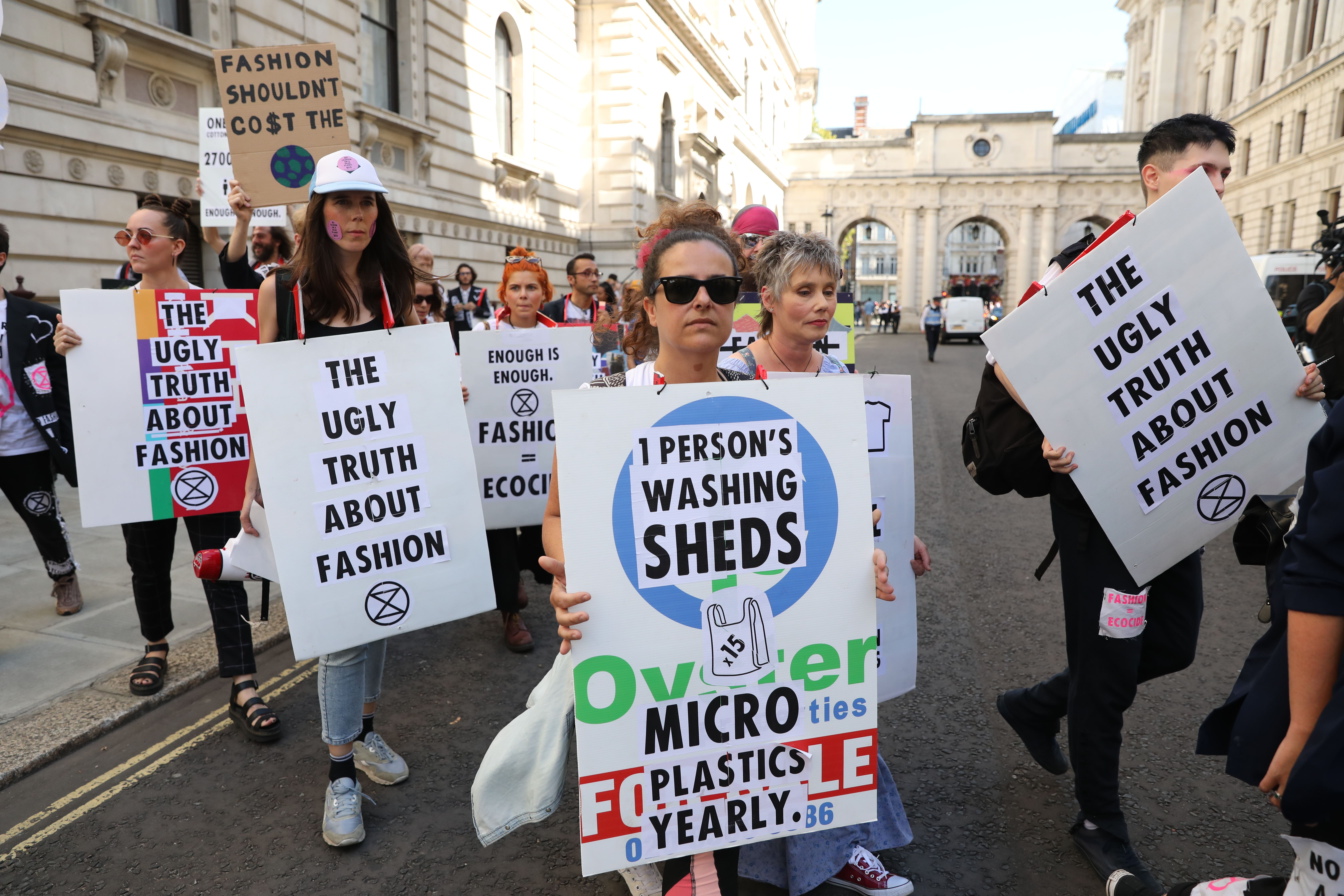No place for London Fashion Week in a climate crisis, XR fashion expert says
Extinction Rebellion’s Clare Farrell wants to replace LFW with something that’s ‘fit for the 21st century’.

Your support helps us to tell the story
From reproductive rights to climate change to Big Tech, The Independent is on the ground when the story is developing. Whether it's investigating the financials of Elon Musk's pro-Trump PAC or producing our latest documentary, 'The A Word', which shines a light on the American women fighting for reproductive rights, we know how important it is to parse out the facts from the messaging.
At such a critical moment in US history, we need reporters on the ground. Your donation allows us to keep sending journalists to speak to both sides of the story.
The Independent is trusted by Americans across the entire political spectrum. And unlike many other quality news outlets, we choose not to lock Americans out of our reporting and analysis with paywalls. We believe quality journalism should be available to everyone, paid for by those who can afford it.
Your support makes all the difference.When Extinction Rebellion first started protesting at London Fashion Week in 2019, it argued the biannual event shouldn’t exist – and that stance is one the global environment movement’s fashion expert still holds today.
Clare Farrell, who helped launch and build Extinction Rebellion, wants to replace it with “an industry-wide dialogue” about fashion’s role in the climate crisis, she told the PA news agency.
“If the fashion industry has a deep look at itself and says, ‘Actually, we don’t want to be the ones who are massively to blame when things start to collapse’ – then you need to do something about that now,” said Farrell.
“It’s already too late to stop atrocity, but it’s not too late to make it less worse.”
For Farrell, the key issue is the fact the fashion industry is so closely linked to oil.
“The fashion and textile industry is often cited as the second-most polluting [industry] on earth, only beaten by oil – so I think very few people understand the carbon footprint of fashion and clothing,” she said.
“I also think it’s important to recognise it’s not just compared with the oil sector, it’s inextricably connected. There are no conversations I’m aware of concerned with how you would have an oil-free fashion industry.”
She cites areas of the fashion industry that often use oil, including transport, plastic packaging, and the clothes themselves as examples.
“You can’t have a fashion industry like the one we’ve got now in a future where you’ve dismantled the fossil fuel industry,” Farrell added – which is why she believes “questioning whether they should exist or not would be an appropriate conversation” for fashion companies.
She noted how at one end of the scale there is fast fashion, which “facilitates an accelerated throwaway culture”, while at the other end we have designer labels, like the ones that show at London Fashion Week (LFW).
“A lot of the people from the luxury end of the industry, they are somewhat able to work with materials with more integrity than people do in the high street space, but that doesn’t mean it’s not got its own enormous problems,” Farrell suggested.
“We know that [luxury brands are] developing massive collections, only to show 30% of it, and then only to produce a fraction of that… A lot of the big houses, the way they develop collections is actually, behind the scenes, really excessive.
“So you make hundreds of samples – that’s very wasteful – and a lot of them are chopped to bits in the process of developing them, then they will go in the bin.”
There is also an issue with the lifestyle the luxury industry promotes, she believes.
Farrell explained: “Culturally, if we’re looking at people flying on planes, holidays to faraway places to have glamorous Instagram post – aspirations of private jets and an exclusive lifestyle, which is associated with the luxury fashion scene.
“If we still hold up those aspirations as something you should live towards and try to attain for yourself, then our aspirations are basically helping to kill us.”
She feels like the fashion calendar is speeding up too, with more collections added to the normal schedule every year: “It feels like it can’t surely get any faster, any more excessive – but whenever I think that, the industry always seems to find a way to become even more wasteful.”
Extinction Rebellion continues to protest LFW – last season calling for the end to fossil fuel sponsorship of cultural events, pouring giant cola bottles filled with fake oil outside the official venue.
With the next season running from September 15-19, Farrell would prefer “something new to be born, something fit for the 21st century”.
She said she can’t speak for the whole of Extinction Rebellion, but believes it’s “terrifying” that “business as usual goes on, whilst we are on course for collapse”.
She added: “An industry-wide dialogue is needed urgently to work out how to make less product, and therefore less waste and less emissions” – and while some brands do advocate for more sustainable practices, a “real systemic overhaul” is needed instead.
“If you do a bit of carbon offsetting and use a bit of recycled polyester – it’s like p****** in the ocean,” said Farrell.
The British Fashion Council was contacted for comment, but did not reply to requests.